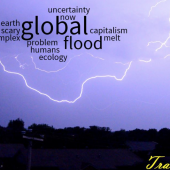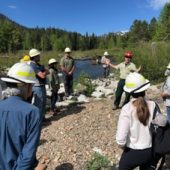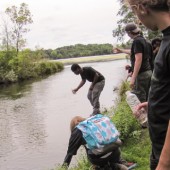
Abstract: The experience and impacts of climate change are uneven across generations, income classes, cultural groups, and geographical locations. Efforts to document and understand such experiences and related perspectives are increasing. Particularly among student groups, there is much attention on understanding how children and teenagers perceive climate change. However, until now, such perspectives of graduate students have not been represented in the literature. We, thus, surveyed and spoke with graduate students from a Geography, Planning and Environment Program at Concordia University in Montreal / Tiohtià:ke, Quebec, Canada. As a sample of next-generation decision makers, they shared fears, concerns, and recommendations consisting of both bio-physical and socio-political scientific dimensions. They expressed interdisciplinary perspectives related to climate change vulnerability, mitigation, and adaptation as they relate to water and extreme weather. Their fears included uncertainties pertaining to climate and human behaviors, and the possibility of surpassing global carrying capacities that could result in irreversible and lethal disasters. Considerations involved recognizing the vulnerability of the climate system and of humans, with a focus on socio-political injustices. Students placed a strong focus on emerging opportunities, such as fostering community development and investing in innovative technologies. They recommended power shifts, through paradigm awareness and reformed policies, where currently vulnerable populations access more decision-making power. They suggested fostering interdisciplinary and international cooperation to integrate climate science, involving age-appropriate modelling programs, into school curricula, and learning about human positionality and from resilient populations. We consider wicked problems, psychological distancing, and climate literacy as influential concerns in shaping climate change contexts and literacy. Our methodology allowed research participants to guide the study’s questions and foci with the use of a survey, collectively-generated word collages, and a focus group. The activities prompted space for the group to practice roleplaying as decision makers. As gentle form of Participatory Action Research, the methods could guide other groups to reflect upon and document their perspectives.
Continue ReadingThis editorial overview provides an introduction to this special Journal of Sustainability (JSE) issue devoted to water and climate change, which is being released during United Nations World Water Day 2020. The article contextualizes some of the water security risks that are exacerbated by climate change, such as increasing floods and droughts. This piece further provides a brief overview of the articles in the special water and climate issue of the JSE.
Continue Reading
In this Q&A, Journal of Sustainability Education (JSE) senior editor Amanda Bielawski interviews Cora Kammeyer, research associate at the Pacific Institute, a California-based non-profit research organization focused on global water challenges. Together, they discuss the role of sustainability education, specifically within the corporate sector, in achieving water resilience in the midst of a changing climate in California and beyond. Following a discussion of California’s water challenges, this piece explores how the California Water Action Collaborative (CWAC) brings together corporations, including Coca-Cola, Google, and Proctor & Gamble, with NGOs such as The Nature Conservancy, WWF, and the Environmental Defense Fund, to engage in collective action and drive corporate water literacy. The interview explores, in part, why the corporate sector is “one of the biggest and most important levers for achieving global water security.”
Continue ReadingThis is a media review of Dr. Wallace Nichols’ (2014) text Blue Mind: The Surprising Science That Shows How Being Near, In, On, or Under Water Can Make You Happier, Healthier, More Connected, and Better at What You Do—with a specific focus on the book’s perspectives on the connections between water and climate change. The review describes the book as a sentinel text, noting that “its related summits have similarly set the stage for continued dialogue and research on our preference for water and the unique qualities that proximity to water has on our overall wellness.” The review specifically illustrates the ways in which the book “offers readers important strategies for dealing with the emotional challenges associated with climate change as well as suggests important insights into climate advocacy.”
Continue Reading
In this Q&A, Journal of Sustainability Education senior editor Amanda Bielawski interviews Diana Virgovicova, recipient of the 2019 Stockholm Junior Water Prize (SJWP). Virgovicova was among the SJWP recipients who recently issued a joint statement to the United Nations (UN) General Assembly that focused on the urgent need for water action, recognizing its intricate links to climate change. Rooted in the praxis framework, the joint statement focused on the critical role sustainability education, specifically, must and will play in turning scientific knowledge about the water-climate connection into actual action through policy change and other means. In this interview, Virgovicova underscored this point: “Education is the way to solve the water-climate sustainability crisis. We need to get more people involved. I think it is regrettable that environmental education is not a required assessment in schools.”
Continue ReadingStudents need to possess accurate conceptions of both Earth’s climate and water systems due to the ramifications of climate change. Using computer-based simulation models gives students practice making and testing hypotheses and conveying comprehension. Gaps exist in the availability of climate change courses and opportunities to use computer-based model both at the introductory level. This case study presents the use of a computer-based model over three iterations of an introductory water course. Data came from student assignments and interviews (n=129). Results of quantitative and qualitative data analyses show that students, regardless of gender, year in school, or major, can effectively apply the Water Balance Model (WBM) to the investigation of climate and groundwater variables. In concert with a flipped course format, students gain experience using the WBM to make decisions surrounding humans, climate, and water to explore the interconnectivity of systems.
Continue ReadingAbstract: The research coordination network (RCN) – Climate, Energy, Environment and Engagement in Semiarid Regions (CE3SAR) is a NSF funded five-year project (2012 to 2016, extend to 2017). One goal of the RCN CE3SAR project is to enhance sustainability education in South Texas. To achieve this goal, the RCN CE3SAR steering committee adopted two strategies: creating learning objects and supporting open education. This article reports the process and methods of creating and publishing RCN CE3SAR sustainability learning objects as open education resources.
Continue Reading
This case study describes an art-led environmental education project at an environmental charter high school in Minnesota. The project is a pilot of the model called Earth Systems Journey, and the theoretical approach of this model is summarized. Its goal is to provide experiential integration: a sense of self and place that are integrated with each other. The case study project, called “River Journey: Exploring the Value of the Mississippi River,” took place in the 2014-2015 school year with students in grades 9-12. River Journey takes students on a journey of their place in the local water cycle to discover how the water that flows through their school’s kitchen sink is interconnected, both upstream and downstream, to the Mississippi River through water and wastewater treatment and distribution infrastructure. Students create a GIS story map as a way to reflect on and integrate their learning and as a public educational resource. The idea of river exploration expands throughout the curriculum in the second half of the year, and another set of GIS story maps explore the river from the perspective of personal stories, population-water resource tensions, water as a strategic element in the Civil War, and ecological issues that occur along the length of the Mississippi River. Art and story inform the design of the journey and its dramatic props, including GIS, used throughout the experience.
Continue Reading